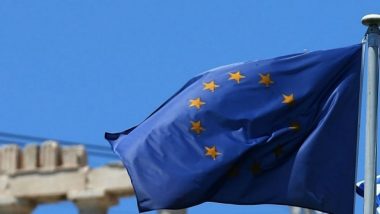Brussels, June 5: Europe could have its free travel zone up and running again by the end of this month, but travellers from further afield will not be allowed in before July, a European Union commissioner said Friday after talks among the bloc's interior ministers.
Panicked by Italy's coronavirus outbreak in February, countries in the 26-nation Schengen travel zone — where people and goods move freely without border checks — imposed border restrictions without consulting their neighbours to try to keep the disease out. The moves caused massive border traffic jams and blocked medical equipment. Also Read | Assam Reports 128 COVID-19 Cases Today, State Tally Reaches 2,243: Live Breaking News Headlines & Coronavirus Updates, June 5, 2020.
Free movement is a jewel in Europe's crown that helps its businesses flourish and many European officials feared that the very future of the Schengen area was under threat from coronavirus travel restrictions. These added to border pressures already caused by the arrival in Europe of well over 1 million migrants in 2015. Also Read | India Begins Campaign For UNSC Seat, 'Country's Approach Will Be Guided By Five 'S's, As Set Out By PM Modi', Say S Jaishankar.
“I personally believe that we will return to a full functioning of the Schengen area and freedom of movement of citizens no later than the end of the month of June,” European Union Home Affairs Commissioner Ylva Johansson said Friday after the video-conference meeting.
All but essential travel into Europe from the outside is restricted until June 15, but many ministers suggested Friday that they want this deadline extended until early July.
The meeting came as the Czech Republic was easing restrictions with some of its neighbours; Austria, Germany and Hungary. Also Friday, Switzerland said it plans to lift restrictions on travel from EU nations and Britain on June 15.
Switzerland is not an EU member but is part of the Schengen travel zone.
Johansson said Europe's Centre for Disease Prevention and Control believes that confinement, social distancing and other health measures are working.
More than 175,000 people have died in Europe's coronavirus outbreak, according to a tally by Johns Hopkins University, mostly in Britain, Italy, France and Spain. “Physical distancing and other health-related measures are still needed, of course. But health authorities are clear that there is no longer a clear justification for either travel restrictions or border measures within the EU Schengen area,” Johansson said.
German Interior Minister Horst Seehofer, whose country plans to lift its remaining border checks on June 15 like many other EU countries, said “the internal border controls will be over in all of Europe at the end of June.”
The news should come as a relief to millions of Europeans still trying to work out their summer vacation plans — which begin for many in July once the school year is over — and who are anxious to know whether they will be allowed to head to the continent's beaches or mountains.
It's also good news for European countries whose economies have been ravaged by the spread of COVID-19 and are hoping for a much-needed boost from their decimated tourism industries. But the perception that Italy is still dangerous is weighing heavily on its tourism sector, which along with related industries accounts for 13% of Italy's gross domestic product.
In an apparent reference to Austria and Greece, which have not fully opened to Italian tourists, Italian Foreign Minister Luigi Di Maio denounced the “ad hoc” measures put in place by some countries as “a violation of the European spirit that has always distinguished us.”
Di Maio said Rome would provide regular infection data to Austria “so they can have certainty about Italy's numbers.” Last week, he said Italy refused to be treated as a leper after Greece announced a list of 29 countries whose citizens could visit without testing or quarantine requirements, but excluded Italians, Britons and residents of other hard-hit countries.
Spanish Prime Minister Pedro Sánchez and Italian Premier Giuseppe Conte have sent a joint letter to European Commission President Ursula Von der Leyen urging “the lifting of restrictions at our internal borders (...) in a coordinated, non-discriminatory manner.” The letter was shared with media in Spain on Friday.
The government leaders of the eurozone's third- and fourth-largest economies want the European Centre for Disease Prevention and Control to play a leading role in “defining as soon as possible these criteria together with the member states.”
Spain, which relies on tourism for 12% of its GDP, plans to wait until July 1 to drop its 14-day quarantine requirement for everyone who crosses its borders, Spaniards included. “Many of our member states are approaching the date when they are going to reopen their borders to tourist mobility,” Sánchez and Conte wrote. “How this process is carried out will largely determine our citizens' perception of the centrality of the European Union in tackling this crisis.”
Germany's Seehofer said most of the EU's interior ministers want to extend the current entry ban on outside travelers “by 14 days until July 1.” Visitors from the United States, Russia or Brazil, for example, would only be allowed back into Europe on based on how those nations have brought the spread of the virus under control, he said.
Those three nations account for 44% of the world's confirmed infections and nearly 38% of the world's confirmed coronavirus deaths, according to Johns Hopkins.
Worldwide, 6.6 million people have been confirmed infected by the virus and over 391,000 have died, according to Johns Hopkins, but experts say the tally understates the true toll of the pandemic due to limited testing, missed mild cases and deliberate government undercounts.
(The above story is verified and authored by Press Trust of India (PTI) staff. PTI, India’s premier news agency, employs more than 400 journalists and 500 stringers to cover almost every district and small town in India.. The views appearing in the above post do not reflect the opinions of LatestLY)













 Quickly
Quickly


